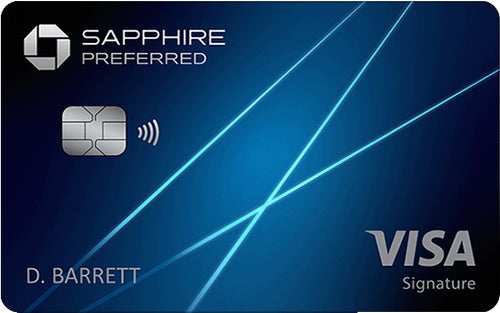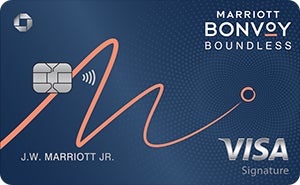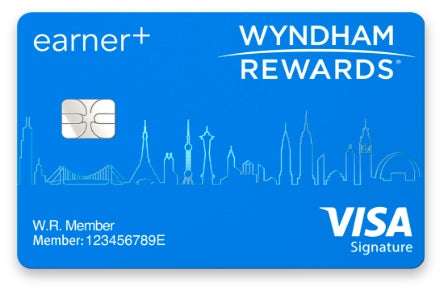| Rewards Rating: | 4.1 / 5 |
| Rewards Value | 4.0 |
| APR | 3.0 |
| Rewards Flexibility | 3.0 |
| Features | 3.0 |
| Issuer Customer Experience | 2.0 |
In a Nutshell:
If you’re looking for a card that makes it easy to earn Wyndham points and perks, the Earner Plus card is likely your best bet thanks to its impressive rewards rates, anniversary bonus and lower-than-average and easy-to-offset annual fee.
See rates and fees
Rewards Rate:
|  |
Introductory Bonus: 45,000 bonus points after spending $1,000 on purchases in the first 90 days, enough for up to six free night stays |  |
Annual Bonus: 7,500 bonus points on your anniversary every year |  |
Annual Fee $75 |  |
APR 20.49%, 24.74% or 29.74% variable |  |
Barclays Customer Service Ratings
|  |
Other notable features: Intro APR offer on balance transfers, intro APR offer on Wyndham Timeshare Purchases, automatic PLATINUM level benefits, cardmember booking discount, no foreign transaction fee, redeem 10% fewer Wyndham Rewards points for go free® awards
If you’re a frequent Wyndham guest looking for a hotel rewards card that makes it easy to earn points on much of your everyday spending, the Wyndham Rewards Earner Plus card is one of your best options.
The Earner Plus card stands out for its top-notch rewards rate in several popular categories, including gas, grocery stores and dining, as well as its relatively low cost, anniversary bonus and balance transfer offer (a rare benefit on a hotel rewards card).
That said, since you can only redeem rewards with Wyndham and its partners, the Earner Plus card doesn’t offer as much flexibility as you can get with a general travel rewards card. While the card can make a lot of sense if you’re after Wyndham-specific perks, a mid-tier travel card from Chase, Capital One or Citi could offer easier redemption and higher rewards value.
Pros
- Anniversary bonus value can nearly offset annual fee on its own
- Terrific everyday rewards rates
- Will likely prove more valuable than the no-annual-fee Wyndham card
- One of the only hotel cards that comes with an intro APR offer on balance transfers
Cons
- You can only redeem points with Wyndham and its partners
- Partners have very poor transfer ratios
- Anniversary bonus not as valuable as some competitor offers
- Doesn’t include an intro APR offer on regular new purchases
- Sign-up bonus is on the low side compared to some other mid-tier hotel cards
Why you might want the Wyndham Rewards Earner Plus card
The Wyndham Rewards Earner Plus card stands out for its popular and practical bonus categories, annual bonus and relatively low cost, all of which make it a solid standalone rewards option if you’re focused on earning Wyndham points and perks. In fact, the Earner Plus card is likely the most lucrative consumer Wyndham card available, despite its annual fee.
Terrific everyday rewards
The Earner Plus card’s everyday rewards rates are among the highest available on a hotel card at this price level. You’ll earn 6 points per dollar on Wyndham bookings and on qualifying gas station purchases, 4 points per dollar on dining and grocery store purchases (excluding Target and Walmart) and 1 point per dollar on all other purchases.
While the Earner Plus card’s rewards rate on hotel bookings is average, its rate on gas station purchases is one of the best available on a hotel rewards card (the Hilton Honors American Express Surpass® Card is one of the only co-branded hotel rewards cards that can match this rate). A rewards rate of 6 points per dollar on gas even beats out the rate you’ll find on some of the best credit cards for gas, making the Earner Plus card an especially valuable choice for commuters.
The card’s impressive rewards rate on dining and grocery store purchases is not the highest available at this price level, but it is the best you’ll find among Wyndham cards. The Earner Plus card offers twice as many points on these purchases as the no-annual-fee Wyndham Rewards Earner® Card. This mix of everyday categories and high rewards rates make the card viable as a standalone card.
Along with your ongoing rewards, the Earner Plus card will unlock Platinum status benefits with Wyndham. This comes with perks like early check-in, late checkout, car rental upgrades, and more, which could make travel more pleasant for frequent Wyndham guests. Without the Earner Plus card, you’d need to stay at a Wyndham property for 9 nights to score Platinum status.
Likely beats lower-tier Wyndham card, despite annual fee
If you’re interested in earning Wyndham points but are wary of annual fees, you may be considering the Wyndham Rewards Earner Card (which carries no annual fee) instead of the Earner Plus card (which carries a $75 annual fee). But there’s a good chance the Earner Plus will be the more lucrative option, even with its annual fee.
To start, the Earner Plus card’s higher rewards rates on groceries and dining should add up quickly, making it easy to offset the annual fee and still net more total rewards value. Let’s say you spend around $1,000 per year at Wyndham hotels, $150 per month on gas, $300 per month on groceries and $150 per month on dining. Even with this relatively modest budget, the Earner Plus card should offer greater value after its annual fee is deducted from your earnings.
Check out this breakdown of each card’s net annual earnings, assuming points are worth around 0.9 cents apiece (based on Bankrate’s latest hotel point value estimates):
| Card | Estimated rewards earned | Annual fee | Estimated total value (minus annual fee) |
|---|---|---|---|
| Wyndham Rewards Earner card | $223 (24,800 points) | $0 | $223 |
| Wyndham Rewards Earner Plus card | $346 (38,400 points) | $75 | $271 |
As you can see, it doesn’t take a ton of spending in the Earner Plus card’s bonus categories for the card to beat out its no-annual-fee alternative.
On top of its higher rewards rates, the Wyndham Earner Plus card also comes with an easier-to-reach annual bonus. While both the Earner and Earner Plus cards offer 7,500 bonus points each year on your account anniversary, the Earner card requires you to spend $15,000 per year to earn these points. The Earner Plus card’s anniversary bonus is available with no spending requirement.
Assuming a 0.9-cent-per-point value (from Bankrate), this 7,500-point anniversary bonus alone is worth around $67 — nearly enough to cover the card’s annual fee on its own. Instead of spending $15,000 to earn $67 worth of rewards with the Earner card, you could spend $75 in annual fees with the Eaner Plus card and automatically have most of that cost offset simply by keeping your account in good standing.
A balance transfer card with long-term value
Like the Earner card, the Earner Plus card could be a big help if you need time to chip away at existing credit card debt while avoiding interest. The card comes with a 0% introductory APR for 15 months on balance transfers made within your first 45 days (20.49%, 24.74% or 29.74% variable APR thereafter).
Balance transfer offers are very rare on hotel and travel rewards cards, giving the Earner Plus card unique appeal. And though the best balance transfer cards can offer much longer intro APR periods (up to 21 months), these cards don’t usually earn rewards, limiting their long-term value.
That said, taking on a credit card annual fee may not be worth it if you already have a lot of debt. If you’re a Wyndham fan looking for a card that will help you pay down your balance but still earn its keep long term, consider starting with the no-annual-fee Earner card instead. You can always upgrade to the Earner Plus card down the line.
Why you might want a different card
Though the Wyndham Rewards Earner Plus card offers solid everyday value and a lower-than-average annual fee, it may not be your most valuable or flexible option for earning travel rewards. In fact, a few competing hotel rewards cards available at this price level offer comparable rewards rates and more valuable annual bonuses.
Unless your priority is Wyndham-specific perks, it’s worth considering a co-branded card from another hotel brand or a general travel rewards card that lets you redeem points for stays at any of the major hotel brands.
General travel rewards cards may offer more value
Though the Wyndham Rewards Earner Plus card carries a terrific everyday rewards rate, it leaves a lot to be desired when it comes to flexibility. As with most co-branded hotel rewards cards, the Earner Plus card only lets you redeem points with Wyndham and its partners (all of which offer poor ratios for point transfers).
If you’d like the freedom to redeem rewards with any major hotel brand (including Wyndham), a general travel rewards card will likely be a better fit than the Earner Plus. The best travel cards also carry much better transfer ratios to partner airlines and hotels.
For example, the Capital One Venture Rewards Credit Card lets you redeem miles with any major hotel brand through the Capital One Travel portal or use miles to cover outside past travel purchases (such as directly with an airline or hotel) — both at a flat value of 1 cent per mile. You can also transfer miles to airline and hotel loyalty programs, usually at a 1:1 ratio.
General travel cards also tend to offer higher point redemption values, with most offering at least 1 cent per point in value but often more when you transfer to partner airlines. The Chase Sapphire Preferred® Card, for example, gets you points boost when you redeem points for travel through Chase Travel℠, or potentially 2 cents per point when you transfer to a high-value partner (based on Bankrate’s point valuations).
Meanwhile, Wyndham’s award chart, while transparent, can make it harder to use your points. You can only redeem for free nights in 7,500-, 15,000- or 30,000-point chunks or use points for a discounted night in 1,500-, 3,000-, or 6,000-point increments. Many general travel cards carry no such restrictions.
Annual bonus isn’t the most valuable out there
Since there’s no spending requirement to earn the Earner Plus card’s anniversary bonus, it has a clear advantage over the Earner card. But it still only offers 7,500 bonus points. Based on Wyndham’s award chart, that’s only enough points to cover a single stay at a low-tier Wyndham property.
Some competing hotel rewards cards offer much more valuable anniversary bonuses, with only a slightly higher annual fee. For example, the Marriott Bonvoy Boundless® Credit Card* charges a $95 annual fee but comes with an annual free night stay in a hotel up to 35,000 points every year after account anniversary. The IHG One Rewards Premier Credit Card also boasts a more competitive annual bonus, offering a free rewards night every year after your account anniversary, plus 10,000 points each year you spend $20,000.
As you can see, though the Wyndham Earner Plus card carries one of the lowest annual fees for a mid-tier hotel card, slightly pricier cards can more than make up the difference with their more valuable anniversary bonuses.
Mediocre sign-up bonus value
The Wyndham Rewards Earner Plus card currently offers a sign-up bonus of 45,000 points after you spend $1,000 in your first 90 days. The Wyndham Rewards program uses an award chart, allowing you to redeem points for free stays in tiers of 7,500, 15,000 or 30,000 points, so these points could be redeemed for up to six free nights at a Wyndham property.
On one hand, this bonus offers 50% more points than you’ll get with the Earner card, with no additional spending requirement. On the other, it falls short of the offers you’ll find on several competing hotel and travel rewards cards.
Based on Bankrate’s latest hotel point value estimates, we estimate this bonus is worth around $405 in hotel stays. Although this is one of the most accessible bonuses you might find on a hotel credit card based on its spending requirement, its value pales in comparison to the value you’ll find on some of the best hotel and travel cards. That pales in comparison to the value you’ll find on some of the best hotel and travel cards.
For example, the IHG One Rewards Premier charges a $99 annual fee (only $24 more than the Earner Plus) and currently offers the chance to earn 175,000 Bonus Points after spending $5,000 on purchases in the first 3 months from account opening. Even if we only give IHG points an average value of 0.7 cents, the welcome offer value is equivalent to up to 175,000 points, worth around $1,225 — way more than the value offered by the Earner Plus card’s sign-up bonus.
The Hilton Honors Amex Surpass card is another great example. It charges a $150, but earns a bonus offer of 130,000 Hilton Honors Bonus Points after you spend $3,000 in purchases on the Card in your first six months of Card Membership, which is still much higher than the Earner Plus card bonus.
How does the Wyndham Rewards Earner Plus card compare to other travel rewards cards?
Because of its high rewards rates and easy-to-earn anniversary bonus, the Wyndham Rewards Earner Plus card is likely the best Wyndham consumer card on the market, beating out the Earner card in long-term value for most cardholders despite its higher annual fee.
But if you’re looking for maximum flexibility and rewards value, other cards will likely be a better fit. Here are a few alternatives to consider:
 |  |  |
Rewards rate
| Rewards rate
| Rewards rate
|
| Welcome bonus | Welcome bonus | Welcome bonus |
| Annual fee $95 | Annual fee $95 | Annual fee $95 |
Other things to know
| Other things to know
| Other things to know
|
Wyndham Rewards Earner Plus card vs. Chase Sapphire Preferred
If you’re looking for maximum flexibility, it’s hard to go wrong with the Chase Sapphire Preferred card. It not only lets you redeem points for travel through the Chase Travel℠ portal or transfer to partner airlines and hotels, but also for cash back (while still getting 1 cent per point in redemption value). Your points are especially valuable when you redeem for travel with Chase since these redemptions offer a higher value when redeemed through Chase Travel.
The Sapphire Preferred also includes a few recurring perks that should help justify its cost. Along with a $50 Chase Travel hotel credit each year, you can earn 10% back on all the points you earn each year. This means if you earn 40,000 points in a year, you’ll get an additional 4,000 points. These benefits combined could prove more valuable than the Earner Plus card’s annual 7,500-point bonus.
Wyndham Rewards Earner Plus card vs. Marriott Bonvoy Boundless card
The Marriott Bonvoy Boundless card offers a few advantages over the Earner Plus card — especially with its annual bonus. You’ll get an annual free night stay in a hotel up to 35,000 points every year after your account anniversary on the Bonvoy Boundless, with no spending requirement (versus just 7,500 points with the Earner Plus).
The Bonvoy Boundless also beats the Earner Plus with its sign-up bonus and rewards rate on general purchases, earning 2 points per dollar on general purchases (versus just 1 point per dollar with the Wyndham card).
On the other hand, the Bonvoy Boundless falls a bit short with its bonus category rewards rates, earning just 3 points per dollar on your first $6,000 in combined purchases each year on grocery stores, gas stations, and dining.
Wyndham Rewards Earner Plus card vs. Capital One Venture Rewards Credit Card
The Venture card offers an exceptionally simple way to earn rewards on all your purchases. You’ll earn 5 miles per dollar on hotels, vacation rentals and rental cars booked through Capital One Travel and 2 miles per dollar on all other purchases, with no need to track spending or juggle a ton of categories. You can easily redeem miles for travel through Capital One or to cover outside past travel purchases, so you also won’t be stuck redeeming rewards with Wyndham if another hotel is a better fit. Plus, you still have the option of transferring rewards to Wyndham at a 1:1 ratio.
You’ll also get a chance at a much more valuable — if harder-to-reach — sign-up bonus (Earn 75,000 bonus miles when you spend $4,000 in the first three months) and up to a $120 credit for Global Entry/TSA Precheck, a benefit usually reserved for luxury cards.
How to use the Wyndham Rewards Earner Plus card
- Keep your account in good standing and you’ll earn 7,500 bonus points each year on your cardmember anniversary
- Use the card for all of your gas, grocery and dining purchases to make it easier to offset the card’s annual fee with rewards
- Plan your free stays based on Wyndham’s award chart, which uses 7,500-, 15,000- and 30,000-point redemption tiers
- Consider using points for discounted stays if you don’t have enough to redeem for a free stay. You can get a discounted night for 1,500, 3,000, or 6,000 points per bedroom plus some cash at participating properties.
- Take advantage of the automatic status perks that come with the card (like early check-in, late checkout and rental car upgrades)
Is the Wyndham Rewards Earner Plus card right for you?
If you’re a frequent Wyndham guest looking for a card that makes it easy to earn Wyndham points and perks, the Earner Plus card is likely your best option. It carries a great everyday rewards rate and straightforward annual bonus while charging a lower-than-average annual fee. Even when you put it head-to-head against the no-annual-fee Wyndham Earner card, the Earner Plus should offer more value to most cardholders.
But be sure to consider other mid-tier hotel and travel rewards cards as well. Some of the top options from competitors like Marriott and IHG as well as issuers like Chase and Capital One could prove more flexible and valuable in the long run, even for Wyndham fans.
*All information about the Marriott Bonvoy Boundless® Credit Card has been collected independently by CreditCards.com and has not been reviewed by the issuer.
All reviews are prepared by CreditCards.com staff. Opinions expressed therein are solely those of the reviewer and have not been reviewed or approved by any advertiser. The information, including card rates and fees, presented in the review is accurate as of the date of the review. Check the data at the top of this page and the bank’s website for the most current information.
Responses to comments in the discussion section below are not provided, reviewed, approved, endorsed or commissioned by our financial partners. It is not our partner’s responsibility to ensure all posts or questions are answered.
